Filtered By: Lifestyle
Lifestyle
Beyond Hallyuwave: For the love of music and dance at the Aliw Theater
Text and Photos by ANALYN PEREZ, GMA News
What binds Filipinos and Koreans together?
For the young, it’s the dazzling colors of Hallyuwave, but for generations of Filipinos and Koreans, it’s the role we played in the Korean War. With more than 7,000 soldiers sent to Korea, our war efforts cemented our diplomatic relationship ever since. Years have passed, but this tradition has not changed.
Last November 8, Filipinos and Koreans shared their love for each other's cultures at the 2014 Philippine Korea Cultural Exchange Festival in the Aliw Theater.
Last November 8, Filipinos and Koreans shared their love for each other's cultures at the 2014 Philippine Korea Cultural Exchange Festival in the Aliw Theater.
The Philippine national anthem was accompanied by a gayageum—a traditional Korean string instrument, while Korea’s Aegukga was accompanied by a Daegeum flute.

The Gayageum is a traditional Korean 12-string instrument, played by Jung Min-Ji in “Lupang Hinirang” and in her special solo number.
Introducing each country was a video presentation showing what these two nations are about. Korea takes pride of its achievements through their valiant efforts and hardwork, which boosted them as one of the economic powers in a short period of time. Meanwhile, the Philippines showcased its warmth, which compels Koreans to keep coming back.
The Philippine Cultural Exchange Festival is an annual event organized by the United Korean Community Association in the Philippines (UKCA), in coordination with the National Commission for Culture and the Arts (NCCA), and various Korean institutions.
This year’s event was a part of the 65th Anniversary of the Philippines and Korea’s diplomatic relations, and a precursor to the ASEAN summit in Busan next year.
This year’s event was a part of the 65th Anniversary of the Philippines and Korea’s diplomatic relations, and a precursor to the ASEAN summit in Busan next year.
NCCA director Marlene Ruth Sanchez said, “We hope that the performances today will inspire us to delve deeper to the wealth of our own tradition that would only allow us to understand and appreciate the values of each other's traditions for our own mutual benefit.”
In the past few years, there have been several exchange programs that were held in the Philippines which aimed to have a better understanding of both countries in order to move forward.
In the past few years, there have been several exchange programs that were held in the Philippines which aimed to have a better understanding of both countries in order to move forward.
Best of the best
Host Jojo Alajar's tirades prompted much laughter from the audience, while co-host Sam Oh provided commentary for Korean performances.
The Bayanihan Dance Group wowed the audience with Filipino traditional dances, including a well-coordinated dance on stacks of chairs.
Since 1997, the Bayanihan Dance Company has been the Philippines's National Folk Dance Company. Beginning from 2002, the Bayanihan has won the grand prize eight times in dance festival competitions.
The Bayanihan Dance Group wowed the audience with Filipino traditional dances, including a well-coordinated dance on stacks of chairs.
Since 1997, the Bayanihan Dance Company has been the Philippines's National Folk Dance Company. Beginning from 2002, the Bayanihan has won the grand prize eight times in dance festival competitions.
Each number was accompanied by a live rondalla band. Reflected in our folk dance and music is a strong Spanish influence.
Meanwhile, the Samulnori group "Molgae" energized the audience with a traditional percussion performance of one of Korea’s agricultural songs. It is used to wish a good harvest during in ancient times.
Molgae was founded in 1987 and it has performed at the 2002 opening of the Korea-Japan World Cup and several international events, such as the 2008 World Music Festival in Morocco.
Molgae was founded in 1987 and it has performed at the 2002 opening of the Korea-Japan World Cup and several international events, such as the 2008 World Music Festival in Morocco.
Aside from traditional performances was Dexter Patente’s rendition of Psy’s top hits, “Gangnam Style” and “Gentleman.”
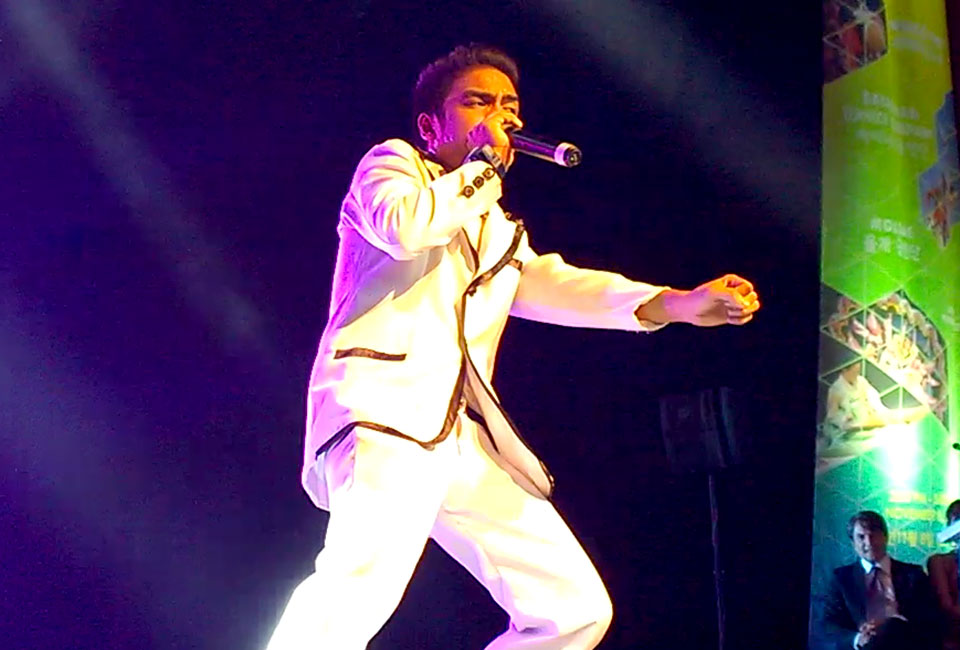
Dexter Pantente’s awesome beatboxing includes Psy’s Gangnam Style, Gentleman, and dubstep beats.
'Bakit tayo mahilig kumanta at sumayaw?'
In a video presentation by NCCA, Chairman Felipe De Leon, Jr. said the reason we Filipinos love to sing and dance is because we are relationship-based people—if not, we are one of the most expressive people in the world.
“Konting taas lang ng kilay, ibig sabihin oo,” he said.
“Konting taas lang ng kilay, ibig sabihin oo,” he said.
The competition was a showcase of Filipinos performing in Korean while the Koreans performed in Filipino. It was divided into two categories: Speech, and Talent. These varied from traditional performance, dancing, to KPop singing. Preliminary rounds were held last October.
Speech contest winners presented their acceptances.
Korea Speech Category winner Christine Dizon explains how Filipinos are in love with everything Korean through Hallyuwave. She won a four-day, three-night stay in Korea.
Filipino Speech Category winner Yang Ju-Hee shared her experience of Filipino hospitality in her 18 years in the Philippines, and how Koreans like her can learn from each other in order to progress.
However, six more contestants vied for the grand prize.
Cainta Korean School performs traditional Nanta—a Korean performance that incorporates dance, use of props, and samulnori drums.
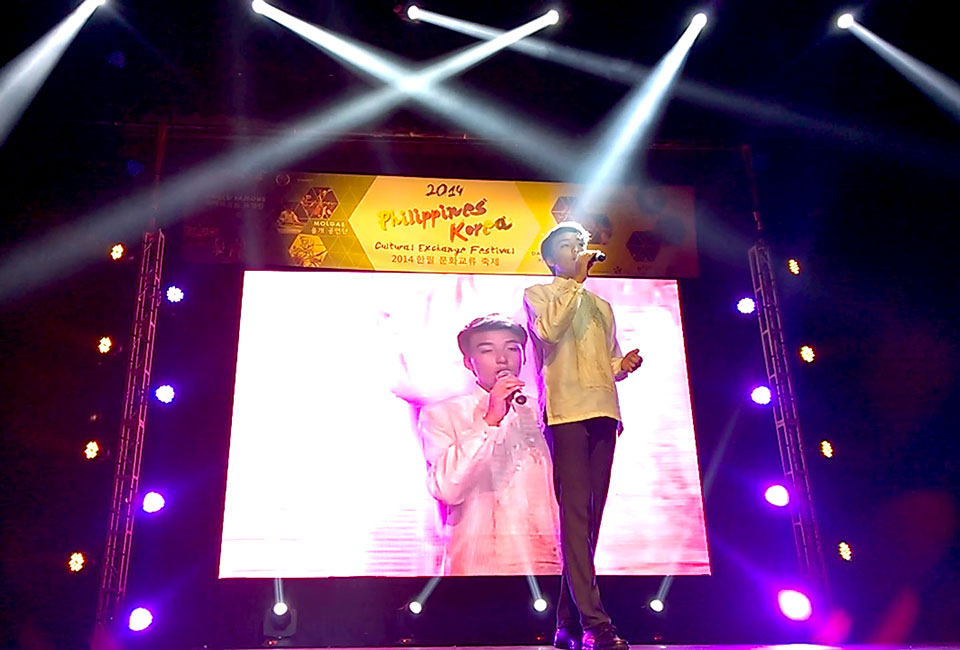
Lee Tae-June sings the OPM song “Hanggang.
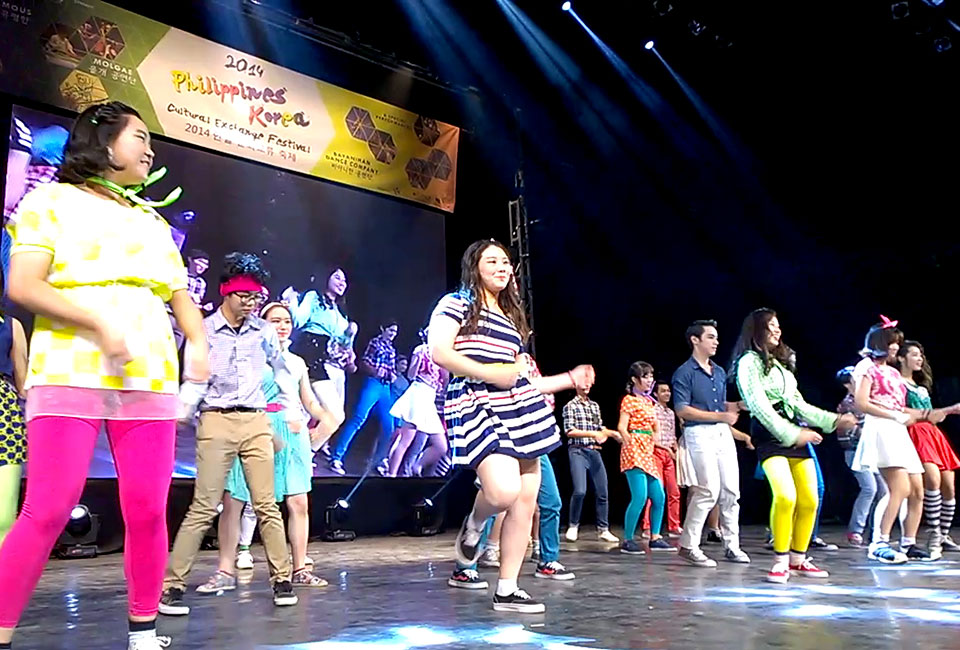
A re-enactment of the evolution of dance by Manila Hankuk Academy.
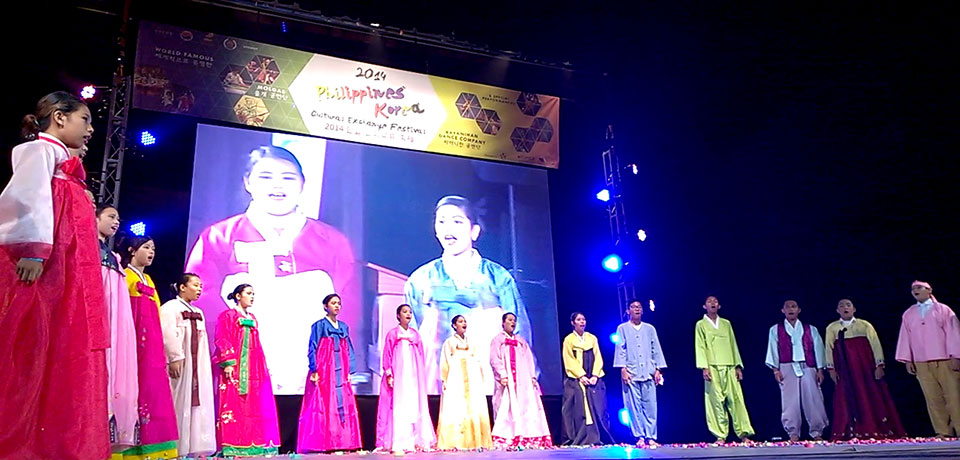
Good Tree International School performs “Arirang”—a Korean folk song.
In the end, group Dance Movers Crew came out the victor with P50,000. The prize money will be used to fund their future expenses and the remaining money will be distributed among the members.
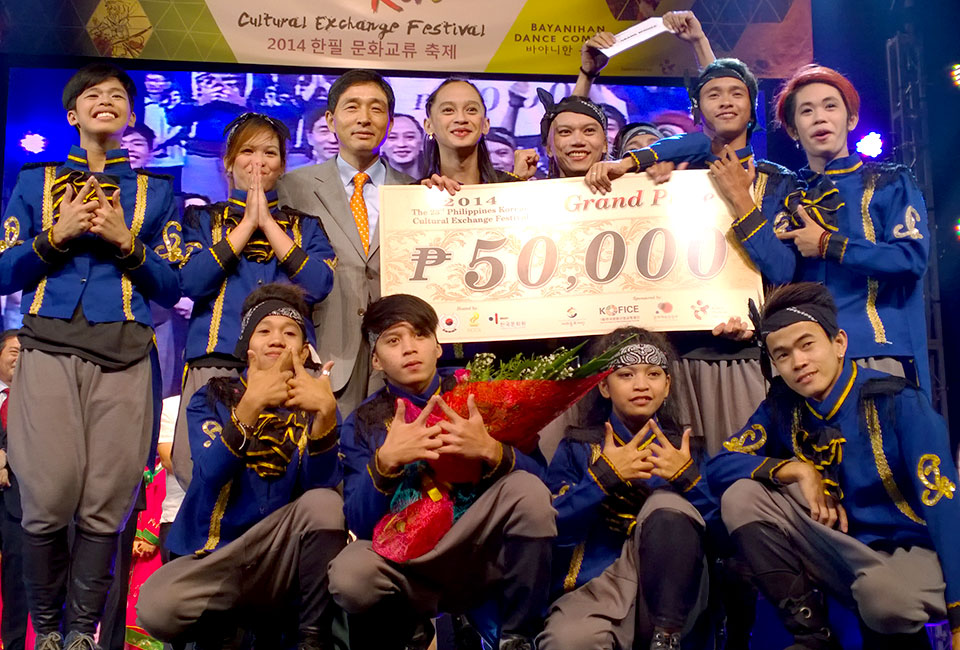
Dance Movers Crew with Korean Ambassador Lee Hyuk.
Other champions of the night include:
- Cainta Koren School bags the 1st runner-up and the P50,000 prize. Awarding them is UKCA President, Lee Jang-Il.
- Korean Consul Min Kyung-Ho presents 2nd runner-up Ingrid Payaket, who performed a soulful rendition of the Korean song “If I Leave.”
- Good Tree International School bagged the Popularity Award.
— VC, GMA News
Catch the next Culture Exchange Festival, by following UKCA’s Facebook page for announcements.
More Videos
Most Popular




